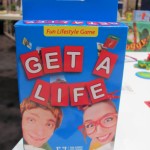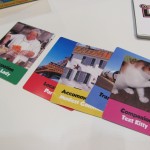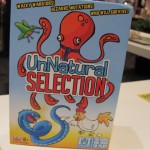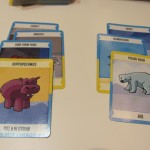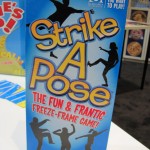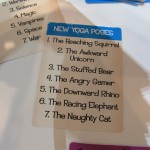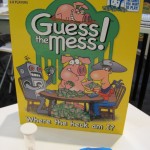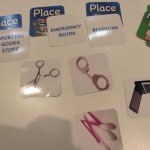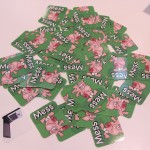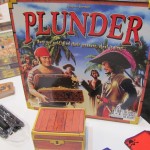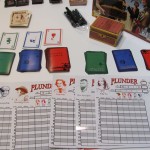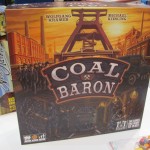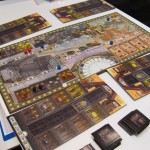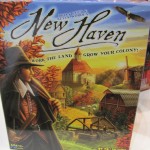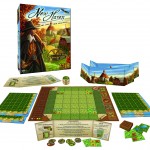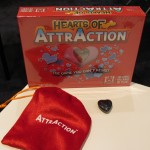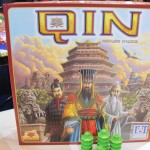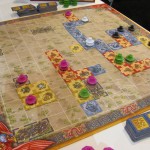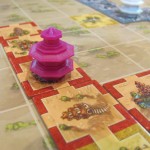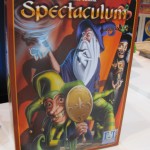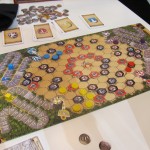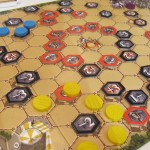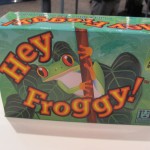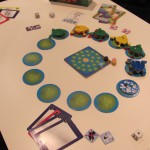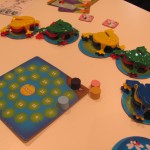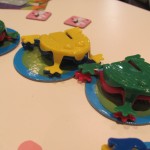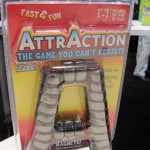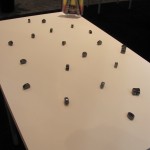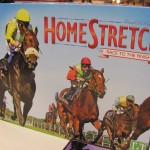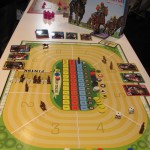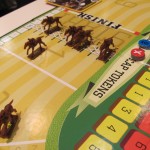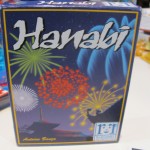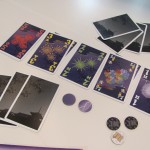 Last year R&R Games debuted for the American market Hanabi, which went on to win the Spiel des Jahres award. Will any of these repeat the feat?
Last year R&R Games debuted for the American market Hanabi, which went on to win the Spiel des Jahres award. Will any of these repeat the feat?
Get a Life ($12, available April) is a party game in which players assemble companion, accommodation, occupation, transportation, and location cards for either the best lifestyle or the worst. The thing is only a portion of a player’s cards are laid on the table, and also action cards allow players to steal or trade cards with each other. Thus, it can be a surprise when a player that appeared to be aiming for worst lifestyle ends up capturing best.
The cards that comprise UnNatural Selection ($11) have both contestant and attribute aspects. The contestant is a type of creature (e.g., hippopotamus and minotaur) and the attribute a wide range of adjectives (e.g., gassy, wearing a clown costume, and academic). Each round, players submit creatures of theirs to compete in a new contest (such as “winner of a potato sack race” or “fastest sausage stuffer”). Then they use their remaining cards to attach attributes to their and their opponents’ creatures. When all cards are played, the player who’s turn it is to judge that round, must choose one creature as the victor.
Strike a Pose ($20, available April) is a Charades-like action party game with a fashion theme. Players are supposed to pose in ways that represent clues within a category. For example, the Yoga Poses category includes “The Awkward Unicorn” and “The Angry Gamer”. The Trades category includes “Cook” and “Shepherd”.
With Guess the Mess ($20, available April) players make a messy pile of item cards, then have 30 seconds to grab as many items as they can that fit a location card. But that’s not the end. When the timer runs out, players pass their collected cards to each other and try to guess which of the locations was the intended fit. For example, do worms, chocolate, bullets, and scissors go in a bedroom or desk?
Plunder ($25) is a detailed deduction game with a pirate’s hidden-treasure theme. The goal in Plunder is to figure out on which island, at which marker, and protected with what trap is each other pirate’s treasure. As players draw cards, ask questions, and narrow the possibilities, they take notes with dry-erase markers. Cards marked with guesses are placed in a treasure chest.
Coal Baron ($45) is a worker-placement game about mining set in the late 1800s in Essen, Germany. For victory points, players need to fulfill contracts for particular types of coal. To get at that coal, though, they’ll first need to expand their mine tunnels and purchase coal carts. But the longer they delay at sending workers to mine, the more workers it will take to extract the needed coal.
Combining tile-placement and resource-management, New Haven ($40, available April) has players building villages in a New World colony. Stone, sheep, wheat, and timber resources are collected through the placement of tiles, and then used to attract tradesmen, build amenities, and entice more colonists.
Hearts of AttrAction ($20) is mostly alternative packaging to AttrAction. The rules are the same. The main difference is that the magnetic pieces are heart-shaped, which R&R reports make them more active.
- Comments Off on Toy Fair 2014—R&R Games
![]()
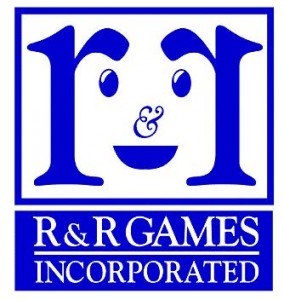 Definitely one of my favorite games of Toy Fair, R&R Games’ Qin is an Asian-themed tile laying game designed by Reiner Knizia. I can’t help but think of it as a multiplayer version of Knizia’s Carcassonne: The Castle, though there is more to it than that. When players lay tiles, they can place their pagodas to claim cities. And whereas it’s not uncommon to have one’s city stolen by an opponent, a city can be protected with a double-pagoda if it’s been expanded to cover five squares. Lost city spaces, of which several are printed on the board, go to the player with the largest contiguous city. Qin ends when either all the tiles are used or when there is no more open space on the board. The winner is the player with the most played pagodas (not the most claimed city spaces.) Qin retails for $40 and includes an advanced-play board on the reverse side.
Definitely one of my favorite games of Toy Fair, R&R Games’ Qin is an Asian-themed tile laying game designed by Reiner Knizia. I can’t help but think of it as a multiplayer version of Knizia’s Carcassonne: The Castle, though there is more to it than that. When players lay tiles, they can place their pagodas to claim cities. And whereas it’s not uncommon to have one’s city stolen by an opponent, a city can be protected with a double-pagoda if it’s been expanded to cover five squares. Lost city spaces, of which several are printed on the board, go to the player with the largest contiguous city. Qin ends when either all the tiles are used or when there is no more open space on the board. The winner is the player with the most played pagodas (not the most claimed city spaces.) Qin retails for $40 and includes an advanced-play board on the reverse side.
Another Knizia-designed title being shown by R&R was Spectaculum, a game about competition among traveling circuses. From the design perspective it’s a stock manipulation game, because circuses aren’t assigned to players, rather players buy and sell shares in all four of the circuses throughout the game. As the winner is the one with the greatest net worth at the end, the goal is to buy shares low and sell high. What I found particularly interesting was that moving the value of the circuses was accomplished by placing travel markers on the board, indicative of sending performers to visit various towns and villages. The retail price of Spectaculum is $30.
Now a third game from R&R, Hey Froggy, from a distance looked only like a very simple kids’ game. The game has cards, dice, colorful plastic frogs, and a board made of lily pads placed in a circle (retail price $16). After getting the demo, though, I can see that there’s a bit of strategy and some other interesting mechanics involved. First of all, the goal of the game is not to get the frogs to any particular destination. The goal is actually to play cards from your hand. The more cards you can play simultaneously, the more points you earn—a 1-card play is worth 1 point, a 2-card play 2 points, a 3-card play 4 points, and a 4-card play 7 points. However, you can only play cards that match the frogs that are on top of the stacks on the lily pads. Manipulating which frogs are on top is where the dice-rolling comes in.
For more straightforward fun, R&R had AttrAction. This game involves flicking and sliding magnets across a table. On your turn you slide a magnet across the table and get to keep any other magnets to which it sticks along the way. If however, it sticks to nothing or falls off the edge, you lose it. When the table is cleared of magnets, the player with the most wins.
And then there was Home Stretch, a horse-racing game where players roll dice to move their own horses but can also bet on other horses. And Hanabi, a cooperative card game with a deduction element—cards are held backwards so a player can’t see his own cards. And four more planned for release further out:
Plunder—a pirate-themed deduction game.
Strike a Pose—an activity game, where the players pose in the form of letters.
Guess the Mess—which involves grabbing cards that give clues to a location.
Unnatural Selection—a party game in which the players pile on descriptor cards (e.g., “smelly” or “lonely”) to both their and their opponent’s personality cards (e.g., “dragon” or “little girl”) in order to convince the judge to choose their personality in that round’s situation (e.g., “the first to be thrown overboard”).
- Comments Off on Toy Fair 2013—R&R Games
Trending
- Massdrop.com
- Oh the Irony—Illuminati Card Game Continues to Inspire Conspiracy Theorists
- Footprints, an Educational Ecology Game
- Home
- USPS Adds Board Game Flat Rate Box
- Baila, the Estonian Drinking Card Game
- Crystal Caste Wins Dice Patent Suit Against Hasbro
- Mirror Game, Red and Blue
- Are Board Games Dangerous?
- Board Games Based on Hindu Mythology
Archives
Most Popular Articles
- Oh the Irony—Illuminati Card Game Continues to Inspire Conspiracy Theorists
- The 20 Most Valuable Vintage Board Games
- The Truth About Dominoes On Sunday in Alabama
- Sequence Game, and Variants
- USPS Adds Board Game Flat Rate Box
- Baila, the Estonian Drinking Card Game
- The 13 Most Popular Dice Games
- Are Board Games Dangerous?
- Guess Who? The Naked Version
- What Happened to the Jewel Royale Chess Set?
Recent Posts
- Toy Fair 2019—Breaking Games
- Talisman Kingdom Hearts Edition
- Toy Fair 2019—Winning Moves
- Toy Fair 2019—Games Workshop
- Toy Fair 2019—Star Wars Lightsaber Academy
- Toy Fair 2019—Stranger Things Games
- Toy Fair 2019—HABA
- Licensing Roundup
- Game Bandit
- 2018 A Difficult Year For Hasbro But Not For D&D Or MtG
Recent Comments
- on Toy Fair 2019—Winning Moves
- on Game Bandit
- on Second Look—Dungeons & Dragons Waterdeep Dragon Heist
- on Crowdfunding Highlights
- on Beyblade SlingShock
- on Game Bandit
- on Game Bandit
- on Watch This Game!, the Board Game Review Board Game
- on Second Look—Vampire: The Masquerade 5th Edition
- on Palladium Books Loses Robotech IP License, Cancels Five-Year-Overdue Robotech RPG Tactics Kickstarter

